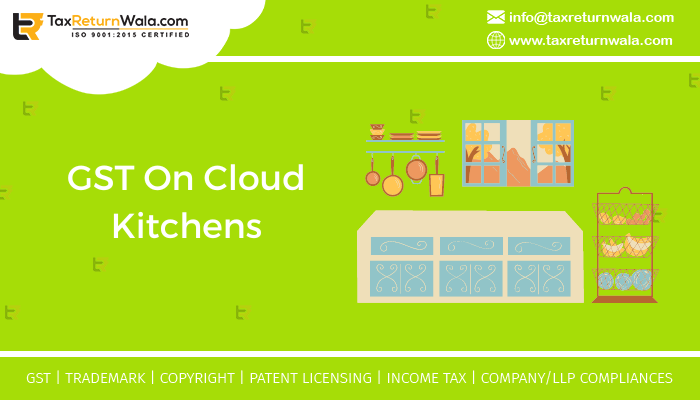GST On Cloud Kitchens
Cloud Kitchens! Sounds different and innovative right?
Well, cloud kitchens came into the limelight when the representations were sought by the GST council for a levy of the GST on the goods or services provided by the cloud kitchens or the central kitchens.
Basically, in simpler terms, a cloud kitchen can be considered as a virtual kitchen or just like a central kitchen where the food is processed and made accessible to the people through takeaways or is made available to them at their doorsteps through their online delivery partners.
Various aggregators such as Swiggy, and Zomato have acted as an agent to bridge the gap between the food manufacturers and the ultimate consumers. Even the e-commerce aggregators have been covered under the ambit of the suppliers and are brought under the taxability criteria like restaurants under the GST act.
The Goods and service tax act levies GST at the rate of five percent on the supply of services by restaurants including the canteens, mess, food joint, and takeaway services. Provided that such rate of the GST is levied only with a prior condition that the supplier does not avail of the input tax credit.
The decision of the GST department to include the cloud kitchens under the umbrella of supplies by the restaurant will surely contribute highly to the GST revenue collections because in the present times, the concept of cloud kitchens has gained popularity and people prefer food being delivered at their door steps by the virtual restaurants.
Provided that, the whole concept of bringing cloud kitchens under the ambit of the GST becomes arbitrable as ultimately the cloud kitchens are engaged in majorly preparing and cooking food and then supplying it so, it must be considered as the supply of the goods and not services.
As per notification no.11/2017-Central Tax (Rate) the term Restaurant Service is defined as follows:
Restaurant service means to supply, by way of or as a part of any service, of goods, being food or any other article for human consumption or any drink, provided by a restaurant, eating joint, mess, canteen, whether for consumption on or away from the premises where such food or any other article for human consumption or drink is supplied.
Through the definition provided, it can be concluded that restaurant services include services by way of providing dine-in facilities along with a serving of food, takeaway, or home delivery of food items or drinks for human consumption.
The above taxability criteria of the cloud kitchens under GST catch heat when we compare the services provided by the restaurants and the cloud kitchens.
The restaurants not only provide the supply of food or drinks for human consumption but also services such as places to dine in, serving of the food, live band performances, etc. Whereas cloud kitchens do not provide a wide array of services, they are majorly indulged in the preparation and supply of cooked food and drinks and provide takeaway services to the consumers.
The core of the GST Act to determine the taxability criteria is the supply of goods or services. The arbitral question which arises here is whether the supply by the cloud kitchens shall be treated as the supply of goods or services. However, as per the latest notification of the GST council, it is considered as the supply of services just like the restaurants.
Learn more about GST and share your Doubts with us, we are just an email away.
Ping us at info@taxreturnwala.com


